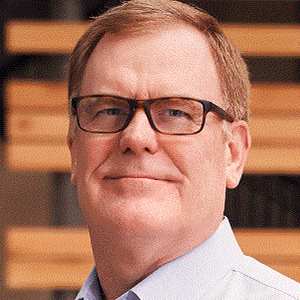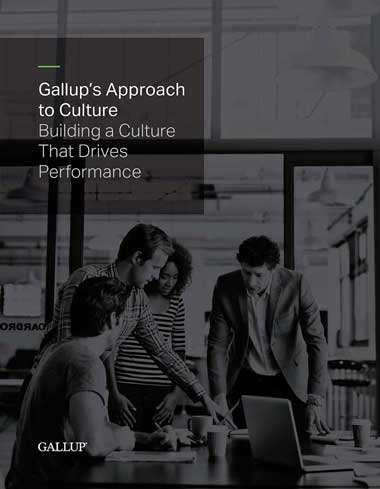A Conversation With Ed Moore

Ed Moore
Executive Vice President and CHRO at Rich Products Corporation
CliftonStrengths Top 5: Developer | Belief | Ideation | Maximizer | Empathy
In 1945, war rationing prevented dairy farmer Robert E. Rich from selling whipped cream to his Buffalo, New York, customers. So, he invented nondairy creamer.
Then he took his product across the nation -- and then, the world. Soon Rich was running the largest family-owned frozen food company in America, Rich Products Corporation, whose advances in food science are still revolutionizing the way the world cooks and eats.
If that sounds innovative, consider what his company did to HR.
They ended it. And created the Associate Experience Network in its place.
It's no HR rebrand; it's a completely new approach to the associate (as Rich's calls employees) experience. "We do a lot of customer journey mapping and engage with customers," says Executive Vice President and CHRO Ed Moore. "My view was that we ought to do that with associates. We care about our associates like family, so why don't we follow a similar process?"
To that purpose, Rich's discarded job titles such as VP of Learning and Development and recast those roles according to nine seminal aspects of the associate experience -- Rich's calls them "moments that matter." People in Centers of Excellence became product owners, HR business partners became consultants, and agile teams emerged to execute for associates the same way Rich's does for its customers. "Our full-time effort and energy -- as the Associate Experience Network -- is focused on delivering exceptional experiences to the associates of Rich Products," says Moore.
There was some resistance to the reinvention, as Moore explains in the following CHRO Conversation, but productivity and engagement rose as people got in the swing of things, and now associates wouldn't have HR any other way. Moore isn't surprised. Robert E. Rich launched his company on innovation -- and it still runs deep in Rich's DNA.
Emond: You've done something truly unique with your HR organization -- you started looking at employees the same way you do customers. Tell me about that.
Moore: To begin with, Rich Products is a very customer-centric organization, and part of our mission is to treat customers, associates and communities the same way -- like family. So, we do a lot of customer journey mapping and engage with customers about what they really appreciate about Rich Products as well as potential points of friction where we can improve their experience. My view was that we ought to do that with associates. We care about our associates like family, so why don't we follow a similar process? Ted Rich [Rich's Executive Vice President, Chief Growth Officer] had done a lot of our customer journey mapping, so I asked him to come in and spearhead the effort to make the HR function be much more associate-centric. We talked to hundreds of associates around the world -- this was pre-pandemic of course -- to find out what experiences mattered most to them, what they value about working in the company. We asked where we were delivering for them, where we can make improvements and then distilled that feedback into nine specific steps along the journey from the time somebody joins the company to the time they leave. We call them "moments that matter."
- My First Impression
- Our Culture
- Our Workplace
- My Manager
- My Work
- My Development
- My Team
- My Rewards
- Saying Goodbye
Emond: How did that inform your rethinking of the HR function?
Moore: For one thing, we don't actually refer to ourselves as human resources anymore -- we're called the Associate Experience Network. Prior to this change, we looked like a very traditional hierarchical system -- "this person reports to that one" and so forth -- and now we're really a network. All my team members are accountable for one or more of those nine moments. The leader who had been the Vice President of Learning and Development now leads the Rich Talent Center, the VP of Total Rewards is now the head of the Rich Rewards Center, and so forth. HR business partners became organizational solution consultants who work with our businesses to solve organizational issues through the lens of these nine moments that matter. People who had formerly been in Centers of Excellence are now referred to as product owners to deliver exceptional experiences against these nine moments. They work with agile teams to rapidly deliver against expectations.
We talked to hundreds of associates around the world to find out what experiences mattered most to them, what they value about working in the company. We asked where we were delivering for them, where we can make improvements and then distilled that feedback into nine specific steps along the journey from the time somebody joins the company to the time they leave.
Emond: Did this change your function's headcount?
Moore: It did not. We have been growing as a company -- we've been a frequent acquirer -- and our company's headcount grew by over 1,000 people through acquisition in 2020 alone. We can prove pretty substantially that this function is now able to do more because of the way we've structured our work. In a support function like ours, it can be easy for people to think that business concepts around Lean and Six Sigma don't apply, but they very much apply. So, we educated the team to apply those concepts to our own work to be in a better position to support our business. And because of it, the Associate Experience Network is more productive even as the associate base we support grows. A similar shift is happening all over the company.
Emond: How so?
Moore: It happened, I think, by shifting the ways people think. If you're in a Center of Excellence, you can get so caught up in what you're doing, you might forget who your products are for. One boss said to me, "When you're in a Center of Excellence, you get really wrapped up in how great the thing you're building is, without considering if anybody asked you for it, if anybody needs it, if you're overengineering it." I think shifting to associate-centric thinking in a product methodology and mindset really helped our Centers of Excellence develop to the right level. To not overengineer. That took a little bit of getting used to because they have to compromise sometimes. If something is statistically significant and scientifically valid but no one uses it, does it matter? We needed to convince some of our team that having "their" product used to a high degree is better than creating a perfect product that sits on a shelf.
Emond: What's the response to your reorganization been so far?
Moore: It's been very favorable. I was most concerned about how people would respond to redesigning the HR function into a networked environment, about not focusing on job titles anymore but really looking at the work, about being more flexible and having a less predictable day, so to speak. I can tell you within just a couple of months of standing up this new organization -- which was met with some resistance, as you might imagine -- the overwhelming response was, "This is great, we feel more productive, we feel more connected." They're more focused on the right kinds of things for the organization and standing up more agile teams to get even more accomplished. Our associate base was very positive. We've always said our customer is No. 1, but now our full-time effort and energy -- as the Associate Experience Network -- is focused on delivering exceptional experiences to the associates of Rich Products. That was music to their ears, and they've been very good about giving us feedback. Managers and leaders, and in particular the senior leadership of the organization, were very supportive of what we were doing. I think that's because [the HR redesign] had its start in the business, with our customer centricity and the way we mapped the journeys and experiences that our "customers" (Rich's associates) value.
Emond: Tell me about that employee feedback.
Moore: This year, we mapped our associate engagement survey questions to the moments we identified in the associate journey, which provided us with meaningful data and associate input. For example, we know that the least favorable moment that matters is what we call "my rewards." Only 70% of our associates rate that favorably. The most highly ranked is "our workplace," which is about our culture, the safety of our associates and our work environment, which has an 85% favorable rating. Our focus groups initially told us that they perceived the biggest gaps in "my development," "my manager" and "my rewards," as I mentioned. We actually saw a seven-percentage-point improvement this year in "my manager," and I think a lot of that had to do with the emphasis we've placed on being a great, purpose-driven leader. That one's improving in a pretty impressive way, but it's also a bit contextual, I think. Given the past year and a half, leaders have had more opportunity to demonstrate their empathy and concern for associates beyond the work.
Emond: Do you think this will change your culture? Or has it?
Moore: Our culture continues to evolve. We've been emphasizing three shifts that we want to make: We want people to create tomorrow, which is about challenging the status quo and inventing solutions. We want them to speak up by sharing their perspectives, even when it's difficult. And we want them to own results, make decisions and act with urgency. Those three shifts very definitely contribute to our culture -- we can only evolve if people speak up, are accountable and focus on creating tomorrow.
I can tell you within just a couple of months of standing up this new organization -- which was met with some resistance, as you might imagine -- the overwhelming response was, "This is great, we feel more productive, we feel more connected."
Emond: Based on what you've learned so far, do you see any tweaks you want to make? Or do you think this is good to go?
Moore: We're looking to tweak the expectations around our agile teams. Agile was a relatively new concept to many in our company, certainly within our function and with the leaders in our function. They don't yet know how to leverage these teams to the extent that they should. But we're really happy with the nine moments; we think we've got a good definition around each of those. The tweaks will come around execution -- being clearer about expectations and going faster.
Emond: You said this reorganization was met with some resistance. Change always is. How did you overcome that? Or did you just wait it out?
Moore: I exercised, in my humble opinion, a great deal of patience to hear the objections over a three-month period. When I felt I had heard all of the questions, all of the objections, I wasn't swayed. I felt that some of the resistance came from hesitation to give up what you know in exchange for what you know a little less about. There were some tangible and symbolic things that signaled the change too. When I told my VP of Learning and Development, "You're going to be the leader of our Talent Center and these four 'moments,'" we had to talk through what that meant and how to communicate it to the outside world. People needed to surface their questions and concerns and make sure I heard them. I did have to put my thumb on the scale a little bit and say, "Let's give it a try. Let's do this, and we'll assess in three months, and if at the end of the first quarter all we've done is create chaos and you guys want to go back, we can talk about going back." But I was pretty convinced they wouldn't. We got ourselves through all of those kinds of things, but it took patience. And now their feedback is, "Now I understand this. This is really a powerful way to go -- let's do more of it."
Explore other CHRO conversations:
- IBM CHRO Nickle LaMoreaux
- Standard Chartered Bank Group Head of HR Tanuj Kapilashrami
- Zurich Insurance Group CHRO David Henderson
- AT&T CHRO Angela Santone
- Merck KGaA CHRO Dietmar Eidens
- Eli Lilly Senior VP of HR and Diversity Steve Fry and Chief Diversity Officer Joy Fitzgerald
- Schneider Electric CHRO Olivier Blum
- UBS Group Head of HR Stefan Seiler
- Huntington Ingalls Industries CHRO Bill Ermatinger
- Schlumberger HR Chief Gavin Rennick
- Genpact CHRO Piyush Mehta
- Roche CHRO Cris Wilbur and Global Head of Talent Innovation Tammy Lowry
- ABB CHRO Jean-Christophe Deslarzes
- Roche CHRO Cris Wilbur
- Mayo Clinic CHRO Cathy Fraser
- Microsoft CHRO Kathleen Hogan
- Dignity Health EVP and CHRO Darryl Robinson
- Sanofi CHRO Roberto Pucci
- Amazon CHRO Beth Galetti
Jennifer Robison contributed to this article, which was based on an interview conducted by Larry Emond.




